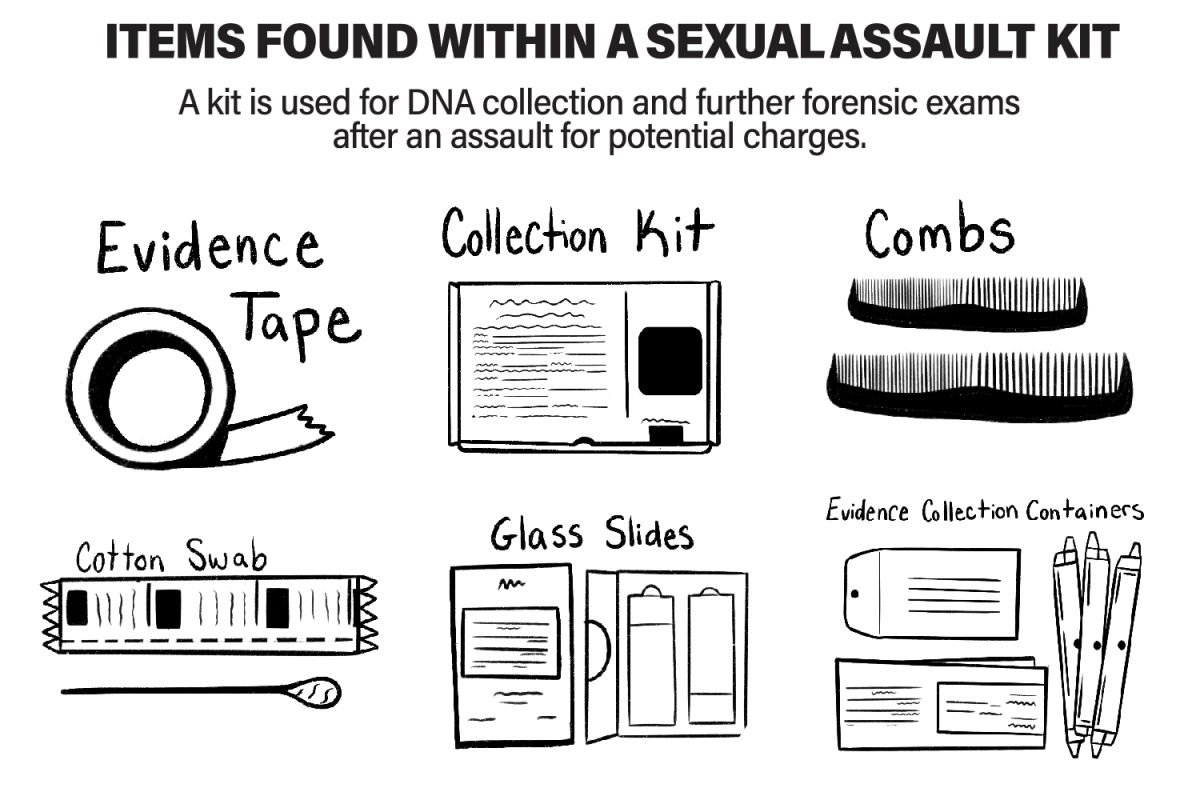According to the Rape, Abuse, and Incest National Network, a sexual assault occurs every 68 seconds in the U.S.
If a victim of sexual assault decides to press charges, a crucial piece of evidence for the investigation is what’s known as a sexual assault kit. Over the past decade, the U.S. Bureau of Justice Assistance has launched the Sexual Assult Kit Initiative so states around the country can address a backlog of sexual assault kits awaiting testing, aiding victims waiting for justice.
In 2024, the Iowa City Police Department, the Johnson County Sheriff’s Office, and the Iowa Department of Criminal Investigation all said there is no longer a backlog of untested kits in the state and country.
This is a somewhat stark comparison to 2017, when there were 43 backlogged kits in the Johnson County Sheriff’s office, 210 at the Iowa City Police Department, and seven in the University of Iowa Police Division, according to the Office of the Attorney General of Iowa.
Nearly 400 kits were submitted to the Department of Criminal Investigations in 2023 and Iowa Department of Public Safety Strategic Communications Bureau Chief Tawny Kruse said all submitted kits are ultimately tested.
Kruse said for the past year, the turnaround time in the Crime Lab DNA unit has been 55 days and the sexual assault kit testing is generally complete in 20 days unless the case requires rushed processing.
Lee Hermiston, Iowa City Police Department’s public information officer, said not all kits are tested, but there is no backlog of collected kits in need of testing.
“The Iowa City Police Department believes in a victim-led approach to sexual assault investigation,” he said. “There are times when our kits have not been tested due to the wishes of the victim or because the suspect was known to us through other investigative means.”
Johnson County Sheriff’s Office Lieutenant Katrina Rudish said there is also no backlog of kits awaiting testing in Johnson Country. As soon as the investigation team gets word to send a kit to the DCI for testing, they send it, she said.
“If the state has a backlog, then that creates a long wait for us when we’re trying to move forward with prosecution,” she said.
Forensic Exams
Sexual assault kits contain various instruments and receptacles for evidence collection of as well as detailed instructions for nurses’ conduction of sexual assault exams and consent forms for the individual having an exam done.
The UI College of Nursing Sexual Assault Nurse Examiner team is responsible for conducting all exams and collecting kits in Johnson County and sending the collected kits to the proper law enforcement agency.
Where kits are handed off to is based on jurisdiction of where the assault occurred. For example, an assault in a UI dorm would be taken over by UI Campus Safety, an assault in downtown Iowa City would be taken over by Iowa City police, and an assault in Hills or areas without an official police force would be handled by the Johnson County Sheriff.
“We get a lot of history from the patient about the assault, and one of the questions we ask is where the assault occurred,” UI SANE Coordinator Katy Rasmussen said. “Obviously, there are some situations that are a little bit iffy because they may not know the specific locations. We just try to get as much information as we can, to narrow it down as much as possible.”
RELATED: New report shows spike in sexual assault reports on UI campus in 2023
UI SANEs conduct roughly 100 sexual assault exams annually, which also includes other medical care for the victim such as emergency contraceptives, STI prevention care, and addressing any other injuries.
“We have specially trained nurses on call, 24 hours a day, seven days a week, to see patients,” Rasmussen said. “We have advocates available so people know that they can still get care.”
Victim and Backlog Advocacy
On Oct. 1, the Domestic Violence Advocay Program officially integrated the UI’s Rape Victim Advocay Program. DVIP Director of Community Engagement Alta Medea said the organization has handled seven sexual assault exams between Oct. 1 and Oct. 18. Medea said October is often their busiest month as it falls in the “red zone,” the time of year when the majority of sexual assaults occur on college campuses.
DVIP’s role in an exam is to send an advocate with a victim to support them and walk them through the process of getting to the hospital and bringing them new clothes or food. Advocates also help victims through the legal process once the investigation begins if charges are pressed.
Medea said in order for a sexual assault kit to be tested in the state of Iowa, a victim has to press charges, so a portion of the backlog is due to situations where a case was never opened.
The average wait time for kit results in 2015 was six months, Medea said, but now she’s seeing kits processed and tested in about six weeks.
“It’s up to the victim how they proceed with it,” Medea said. “The idea being that if you aren’t pressing charges, it’s not absolutely vital to your case to have that evidence, so they prioritize those that need evidence. For victim survivors moving forward in their case, that priority is important to that process.”
In addition to providing advocacy resources, DVIP is a member of both the Iowa Coalition Against Sexual Assault and the Iowa Coalition Against Domestic Violence. As a 501c3, DVIP can’t lobby the government, but these membership organizations can lobby on their behalf for areas they feel are in need of reform, like the sexual assault kit backlog.
DVIP also attends legislative kickoff events to introduce themselves and their services to newly elected officials, and educate them on the current issues surrounding domestic violence and sexual assault. The organization educates lawmakers in Des Moines as well where they present their services and needs to the Iowa State Legislature every March.



